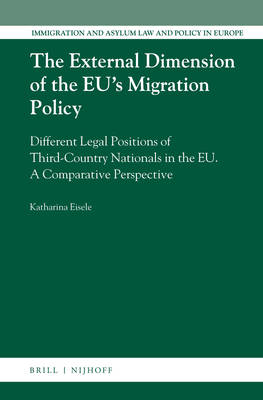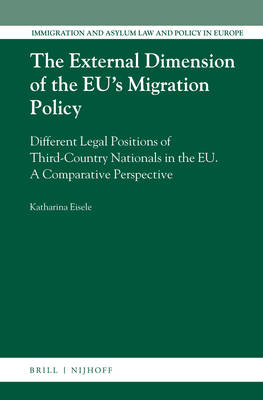
Je cadeautjes zeker op tijd in huis hebben voor de feestdagen? Kom langs in onze winkels en vind het perfecte geschenk!
- Afhalen na 1 uur in een winkel met voorraad
- Gratis thuislevering in België vanaf € 30
- Ruim aanbod met 7 miljoen producten
Je cadeautjes zeker op tijd in huis hebben voor de feestdagen? Kom langs in onze winkels en vind het perfecte geschenk!
- Afhalen na 1 uur in een winkel met voorraad
- Gratis thuislevering in België vanaf € 30
- Ruim aanbod met 7 miljoen producten
Zoeken
The External Dimension of the Eu's Migration Policy
Different Legal Positions of Third-Country Nationals in the Eu: A Comparative Perspective
Katharina Eisele
€ 358,95
+ 717 punten
Omschrijving
In recent years the EU has been active in developing a common European immigration policy in cooperation with third countries and in building an "external dimension" of such an EU policy. The linkages between the EU's external relations and migration policies have influenced the distinct legal positions of third-country nationals (non-EU nationals). This book critically discusses whether the EU's objective of creating a common EU migration policy can be achieved against the backdrop of a highly fragmented EU framework for migration law and policy, and it argues that it is difficult to speak of one single, unitary group of third-country nationals forming the counterpart to EU citizens.
Specificaties
Betrokkenen
- Auteur(s):
- Uitgeverij:
Inhoud
- Aantal bladzijden:
- 556
- Taal:
- Engels
- Reeks:
- Reeksnummer:
- nr. 34
Eigenschappen
- Productcode (EAN):
- 9789004265240
- Verschijningsdatum:
- 8/05/2014
- Uitvoering:
- Hardcover
- Formaat:
- Genaaid
- Afmetingen:
- 163 mm x 239 mm
- Gewicht:
- 975 g

Alleen bij Standaard Boekhandel
+ 717 punten op je klantenkaart van Standaard Boekhandel
Beoordelingen
We publiceren alleen reviews die voldoen aan de voorwaarden voor reviews. Bekijk onze voorwaarden voor reviews.









